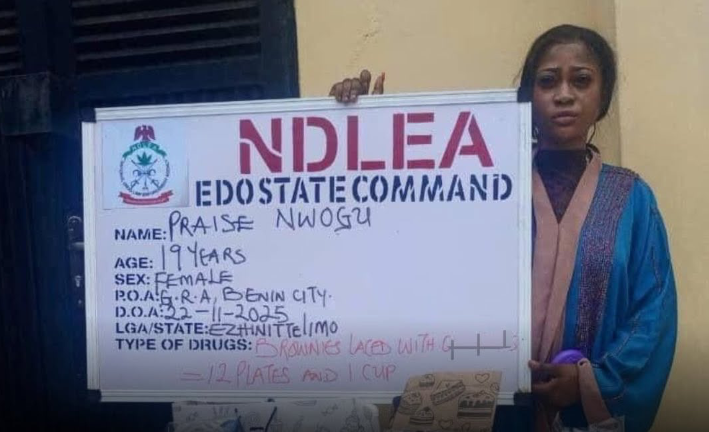
Sweet Fame, Bitter Fall: How TikTok Star CandyTeddy’s Drug-Laced Brownies Led to a Shock Arrest in Benin City

The bustling streets of Benin City were thrown into fresh conversation and concern over the weekend after the arrest of popular TikTok content creator, Praise Nwogu, widely known to her followers as CandyTeddy. The rising social media star, whose bubbly personality and viral dance skits earned her thousands of loyal fans, is now at the center of a growing drug scandal that has sparked outrage, surprise, and renewed worry about the misuse of social media influence among Nigerian youths. Her arrest, alongside that of a 25-year-old accomplice, Ebong Emem Oghosa, was confirmed in a statement released on Sunday, November 23, 2025, by Femi Babafemi, Director of Media and Advocacy for the National Drug Law Enforcement Agency (NDLEA).
According to the agency, the pair were apprehended on Saturday, November 22, in an operation carried out within Benin City after intelligence reports linked their names to the production and sale of drug-laced baked goods, especially brownies. At the point of arrest, officers reportedly found CandyTeddy in possession of 12 plates and one cup of brownies infused with illicit substances, while her associate, Oghosa, was caught with 76 grams of skunk, 1.5 grams of Colorado, and several more drug-laced brownies packaged for distribution. For many who have followed her online journey, the revelation was an unexpected turn that showed how rising fame can sometimes hide troubling realities.
The NDLEA’s findings have triggered new concerns among authorities over how social media platforms — especially TikTok, which is popular among teenagers and young adults — are increasingly being used not just for entertainment, but as discreet channels for promoting and distributing illegal substances. What used to be platforms for creativity, humour, and harmless trends have also become avenues for secret marketing of narcotics disguised as everyday treats. Officials warn that this trend is not only dangerous but could also endanger countless young people who often trust their favourite influencers without question.
CandyTeddy, whose online content often revolved around lifestyle, comedy, and entertainment, has now become a reference point in conversations around the responsibility of influencers and the growing pressure on young content creators to maintain relevance. Many Nigerians familiar with her work expressed shock, while others argued that the rise of drug-laced edibles among youths has been a long time coming, considering the increasing glamorization of substances on various online platforms. Her arrest has brought renewed attention to how seemingly harmless trends can quickly spiral into criminal ventures behind the scenes.
In the official statement, Babafemi emphasized that the agency is intensifying its crackdown on drug trafficking and abuse, especially in Edo State, which has been flagged as one of Nigeria’s hotspots for emerging drug distribution networks. He described the arrest of CandyTeddy and Oghosa as part of ongoing efforts to dismantle both small-scale and organized drug rings that exploit digital spaces to evade traditional law enforcement tracking methods. With an increasing number of cases linked to online marketplaces, private messaging channels, and social commerce, authorities say they are now expanding their surveillance and intelligence operations to match the evolving landscape of drug-related crimes.
Residents of Benin City have reacted strongly to the development, with many expressing worry about the rising sophistication of drug distribution in recent years. Some lamented the trend of young people experimenting with enhanced or addictive substances disguised as snacks and energy boosters. Parents and guardians, in particular, have voiced concerns about how such products could easily find their way into schools, parties, and youth hangouts if stricter controls are not put in place. The arrest has reignited calls for more awareness campaigns and educational programs aimed at sensitizing young Nigerians about the hidden dangers behind certain viral trends.
Among online communities, reactions have ranged from disappointment to disbelief, with many insisting that social media fame often places unhealthy pressure on young creators, pushing them toward risky ventures that promise easy money. Content creation, particularly on TikTok, has become a competitive space where visibility often translates to financial gain. But as some analysts note, the line between legitimate business and criminal exploitation can become blurred when the pressure to remain relevant collides with the desire to monetize popularity quickly.
For now, the NDLEA has disclosed that investigations are still ongoing to determine how far the distribution network extends and whether more individuals are involved in the production or sale of drug-laced edibles in the area. Officials are also examining whether CandyTeddy and Oghosa had ties to larger drug networks supplying their ingredients or facilitating their operations. The agency is expected to release further details in the coming days as interrogation and evidence review continue.
The arrest has become a cautionary tale for young people navigating the intersection of fame, peer influence, and online visibility. It underscores the need for digital literacy—not just in terms of content consumption, but in understanding the hidden risks behind seemingly harmless online promotions. While many Nigerians continue to enjoy the positive side of social media, authorities warn that the darker corners of the digital ecosystem must not be ignored.
As CandyTeddy awaits further legal action, her story serves as a reminder that the pursuit of online popularity should never come at the expense of personal integrity or public safety. Her fall from grace has left fans disappointed and has highlighted the urgent need for tighter monitoring, stronger enforcement, and more proactive education for young people immersed in the ever-changing world of digital content creation. The case continues to unravel and will likely spark more conversations in the days ahead as Nigeria confronts the growing challenge of drug abuse and the exploitation of online platforms for illegal trade.


